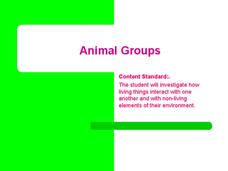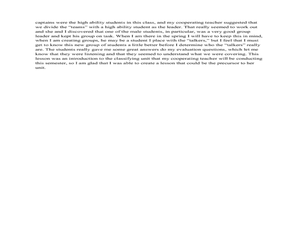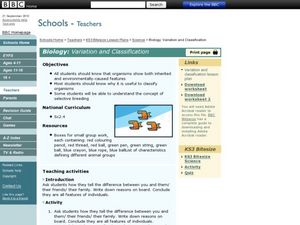Curated OER
Are You One Of Us?
Young scholars discover how to classify things based on their similarities and differences. Students give the characteristics of insects and create a classification list. Given examples of various types of insects, young scholars...
Curated OER
Classification is Sweet
Young scholars classify, weight and organize items during this instructional activity. This instructional activity works great as or with an introduction of the Periodic Table of Elements.
Curated OER
Classification of Clouds
Students view a cloud slide show presentation and identify types of clouds. They estimate height based on cloud's appearance. They discuss the vague nature of cloud nomenclature and compare it to the English standard measurement system.
Curated OER
Classification 2
Young scholars discuss what makes a living thing (for example, cellular respiration) and collect a selection of living things from outside. They divide their organisms into plants and animals and create a key for the divisions.
Curated OER
Animal Groups
This animal science PowerPoint introduces various types of animals that live in groups. The slides contain real photographs along with explanations of why animals live in groups and what their roles are.
Curated OER
Animal Classifications
Third graders work in small groups to investigate how to sort a variety of items into groups and subgroups. They work on a class chart based on the activity which show how the items are classified based on commonalities. Upon completion...
Curated OER
A Taxonomic Key and Local Trees
Learners gain an understanding of the science of taxonomy and how it is used in classifications. They use an identification key and construct a key of their own. They identify tagged trees on the school property with their lab group...
Curated OER
Animal Classification
Students classify animals. In this animal classification lesson, students identify characteristics from each of the 5 categories of vertebrates. Students group animals by categories.
Alliance Theater
The Jungle Book Post-Show STEAM Lesson
An ecosystem is really just the flow of energy through many different living organisms. A study of Rudyard Kipling's The Jungle Book leads to an environmental science activity in which learners study how various factors can affect...
Curated OER
Invertebrate Diversity
Comparative anatomy prevails in the lesson exploring diversity among invertebrates. Biologists examine physical characteristics of an earthworm from phylum annelida and a meal worm from phylum insecta. They also inspect a cricket and a...
Biology Junction
Arthropods
Even the creepy crawlers have pretty amazing anatomy! A thorough lesson describes characteristics of arthropods with an emphasis on their structures. Beginning with a review of the taxonomy hierarchy, the lesson explains the different...
Curated OER
Classify That!
Young scholars explore diverse forms of life by using modern biological classification systems to group animals that are related. Students then study basic scientific groupings like genus, species, mammals, fish, birds, amphibians, and...
Curated OER
Classified Information - Part 1: Shapes
Third graders investigate how and why scientists use classification. They discuss classification strategies using animals, and as a class fill in a flowchart with their responses. Next, in small groups they cut out a variety of shapes...
Curated OER
Classifying the Class
Fifth graders create dichotomous keys to create classifications of students in the classroom by writing instructions. In this classifications lesson plan, 5th graders learn how dichotomous keys are used in science observations.
Curated OER
Classifying into Categories
In this classification worksheet, students organize their thoughts by classifying the words from the box into the following categories: birds, mammals, reptiles, and fish.
Curated OER
Sink or Float
Third graders sort objects into those they think will float and those that will sink and test their predictions. They experiment with clay molding it into shapes that float. They place pennies in them until they sink. They test other...
Curated OER
Essay Modes: Different Kinds of Essays
Review many different types of essays with this presentation. Each slide gives a short description of an essay such as narrative or persuasive. Makes for a good overview of various formats.
Curated OER
Classification of Materials
Students classify photographs into a two-way classification system. They practice with pictures of people who are young and old, male and female, then they use pictures of animals to create their own two-way classification system.
Curated OER
Analysing Scientific Explanations for Megafauna Extinction
Students compare explanations for Australian's megafauna extinctions and identify reasons for popular acceptance of certain scientific explanations. They debate and analyze scientific explanations.
Curated OER
One-Difference Classification Train
Students practice their classification skills through hands-on practice. Working in groups, students identify various ways in which similar items can be classified. Given a kit of similar items, students classify objects in multiples...
Curated OER
Classification of Organisms
In this classification activity, students complete a crossword puzzle with 17 clues about vocabulary pertaining to the classification of organisms.
Curated OER
Classification of Organisms Crossword Answers
In this classification worksheet, students are provided with the answers to a crossword puzzle which has 17 clues pertaining to classification of organisms vocabulary.
Curated OER
Biology: Variation and Classification
Students investigate classification of different animal groups. In this biology instructional activity students list characteristics of themselves and others they know to show differences and how they are classified. Students...
Curated OER
Classifying "Pastanimals"
Young scholars explore biology by creating a poster presentation. For this animal classification lesson, students utilize a SMART board and practice organizing a group of animal shapes by placing them with similar animal families. Young...

























